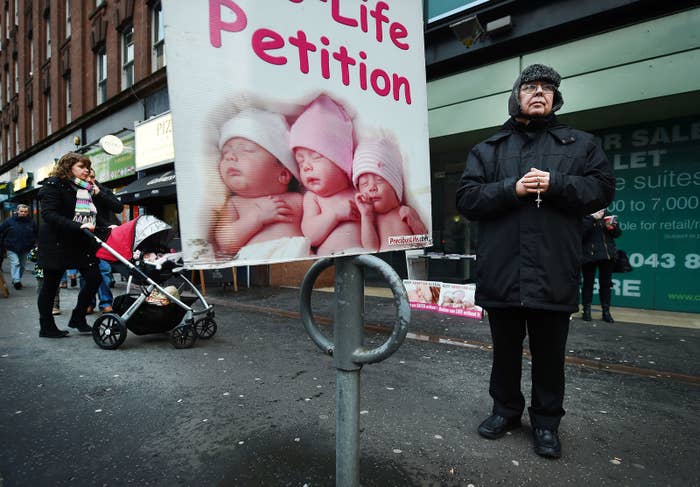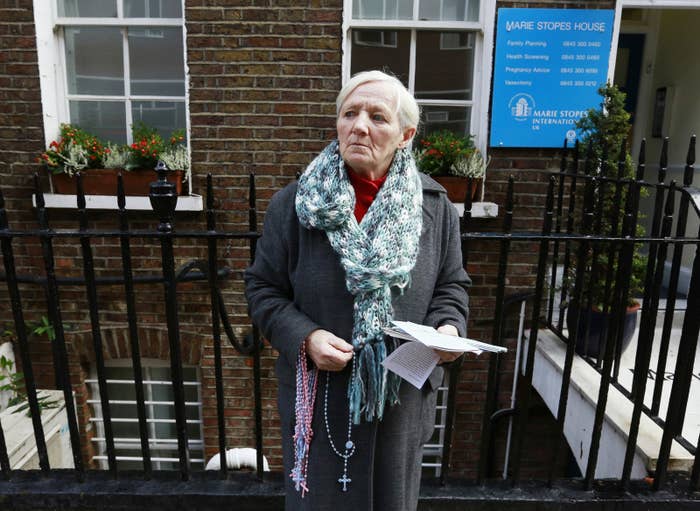
Abortion charities are calling for "buffer zones" to be introduced outside clinics in UK to prevent women being subjected to aggressive protests by anti-abortion activists.
The call comes after the broadcast of an investigation by Channel 4's Dispatches into campaigning by the anti-abortion Good Counsel Network (GCN).
The investigation found that women have been left in distress after being accosted with plastic models of foetuses and being told by GCN staff that a termination would increase their risk of breast cancer, something medical experts say is not true.
Earlier this year, BuzzFeed News reported a bitter dispute between the same group and residents living near an abortion clinic in Richmond. GCN's aggressive tactics in the dispute at times verged on physical violence.
"One of my colleagues was called a 'murdering whore' on her way to work," Genevieve Edwards, of the sexual and reproductive health service Marie Stopes, told BuzzFeed News. "This would not be tolerated outside any other health service. It's disgraceful."
She said: "At our Ealing clinic a few weeks ago, a patient arrived in absolute floods of tears and in a complete state because the protesters had really upset her on the way in.
"I’ve spoken to nurses who say they can’t take blood pressure for 20 minutes because the patient needs to calm down. That’s so wrong."
She said that while protesters had the right to share their views, "there’s a difference between protesting and harassing women”.
"I defend the right to freedom of speech, but I would just like it away from clinic doors,” Edwards said.
The practice of enforcing buffer zones around abortion clinics is common practice in America and some other European countries, Abigail Fitzgibbon, head of advocacy and campaigns at the British Pregnancy Advisory Service (BPAS), told BuzzFeed News.
"It’s actually quite unusual that we’re a country that doesn’t have them already," she said.

Fitzgibbon said disturbances by groups like GCN needed to be taken more seriously by the Home Office and that the department should examine the root cause of the problem, just as it would with hate crimes against other groups. She felt buffer zones were a good interim solution, however.
"If women were able to avoid protesters, it would be much more manageable for those who are scared," she said. "We want women to have a choice not to be confronted by those people."
In a statement to BuzzFeed News, a Home Office spokesperson said "peaceful, lawful protest is a vital part of a democratic society – but protesters' rights need to be balanced with the rights of others to go about their business without fear of intimidation".
They said that managing demonstrations by groups like GCN was the responsibility of the police, and that all suspected criminal behaviour should be investigated.
"Police also have powers to set conditions on a demonstration – including its location, how long it lasts, and how many people are involved – and can disperse people if their harassment is causing distress,” the spokesperson said.
But Fitzgibbon said the issue is not being properly monitored and is therefore likely only to get worse.
"They [anti-abortion activists] want to present a particular image but what they actually do when the police aren’t watching is very different,” she said, “which is why you need to be very careful in listening to what women and abortion clinic staff say about them.”
She said it was likely a lot of incidents go unreported because many women do not want to publicly declare that they’ve visited an abortion clinic. "I think that’s a really dangerous position for British women to be in," Fitzgibbon said.
Edwards said police are always supportive when called to attend an incident with protesters, but said more needed to be done. "Although the police will come and ask them [the protesters] to behave, 10 minutes later they’ll be back," she said.
While those who oppose abortion in Britain are in the relative minority, and those engaged in activism against it are in an even greater minority still, the impact of the activism is still significant. "It only takes a tiny number of people with very extreme views to cause a massive amount of pain for other people," Fitzgibbon said, “and I think that’s what’s happened with this issue.”
She said she’s concerned that the more extreme anti-abortion protesting seen in America was beginning to be imported to the UK. "I think the American pro-life movement sees making progress in liberal Britain as a real goal for them," she said.
Fitzgibbon said activists may "double down … and try and push the boundaries of what they can get away with more and more".
Edwards said buffer zones are vital in helping to curb that kind of escalation. "The attacks on some clinics [in America] are really extreme and I would hate to see anything like that here," she said. "If we're acting now, there are steps we can take to prevent that before anything happens, which would be awful."
